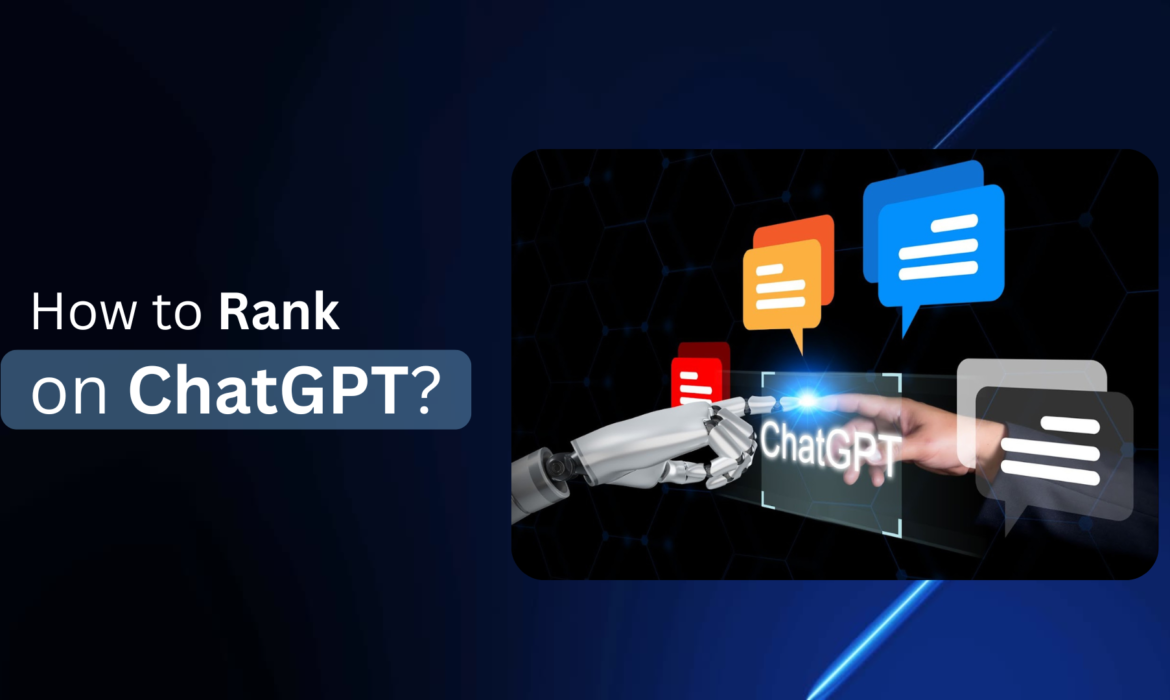How to Rank on ChatGPT?

Table of Contents
ToggleThis is the million-dollar question every forward-thinking business is either asking now or will be very soon.
Is there a guaranteed way to rank on ChatGPT?
Well, not quite. The AI landscape is evolving rapidly, and there’s no single rulebook yet.
But can you increase your chances of being featured or mentioned by ChatGPT and other AI platforms?
Absolutely!
At Growth Accelerators, we’re a boutique SEO agency, and for over a year, we’ve been closely observing how ChatGPT responds to a variety of user queries. In this blog, we’re sharing our firsthand insights and what we’ve learned along the way.
Traditional SEO and ChatGPT SEO
Let’s bust a myth right away: ChatGPT SEO isn’t a whole new science. In fact, the fundamentals of traditional SEO still matter a lot.
Whether it’s Google Search or ChatGPT, at the core, both want to give a relevant User Experience and address user intent correctly.
That said, ranking on ChatGPT also involves understanding how AI models are trained and they interpret information, which can differ from how search engine algorithms operate.
Key Strategies to Help You “Rank” on ChatGPT
Let’s look beyond keyword stuffing. The below will help your business rank not only on ChatGPT but even the AI overviews by Google. Let’s begin:

1. Optimizing the website for better user experience (UX)
This is crucial for creating a presence on ChatGPT. Build a website that offers smooth navigation and loads quickly. A fast, user-friendly site often signals quality and trust.
For instance, a service business website that loads in under 2 seconds and clearly lays out its offerings is more likely to be referenced positively, both by users and AI tools.
Pro tip: Use tools like Google PageSpeed Insights or GTmetrix to audit and improve your load times.
2. Website content should address the user queries
The more relevant your content, the better the user experience. It’s essential to structure your website’s content to provide a complete and fulfilling experience offering comprehensive information through text, infographics, and videos. Including FAQs, blogs, and case studies further enhances credibility and engagement.
Example: If you run a SaaS business and you have a detailed blog post titled “How Our Tool Helps E-commerce Stores Reduce Cart Abandonment by 30%”—with stats, visuals, and FAQs you’ve just made it easier for ChatGPT to recognize your authority on that topic.
3. Get Mentioned on Authoritative Websites
ChatGPT has been trained on vast amounts of internet data including blogs, news sites, forums, and review platforms. So, if your brand gets mentioned on trusted websites you increase the likelihood that ChatGPT will identify your brand as authoritative for related topics.
For instance, a B2B company featured in an industry roundup on Forbes or Business Insider is more likely to be surfaced by ChatGPT for related industry queries.
4. Participate in Forums & Communities
Active presence on platforms like Reddit and Quora, can really help.
Here’s why:
These platforms are full of organic, user-generated Q&A discussions.
ChatGPT often uses patterns and examples from such forums to form its responses.
Example: If your startup is regularly participating in relevant Reddit threads and offering advice, case studies, and helpful insights, ChatGPT might mention your brand or echo your solutions in future responses.
5. Encourage reviews across platforms
Reviews act as social proof and credibility signals, not just for people but also for AI models.
Be present and active on:
- Google My Business
- Trustpilot
- Clutch (for B2B)
- Yelp
- Industry-specific review sites
For instance, a boutique hotel with hundreds of positive Google reviews is more likely to be suggested by ChatGPT when someone asks, “Best boutique hotels in San Antonio.”
There’s No One-Size-Fits-All Strategy for ChatGPT
We’ve observed that different industries gain visibility on ChatGPT based on varying factors. For some, it’s the awards and recognitions they’ve received that boost their presence. For others, it’s the depth and quality of content on their own website that makes the difference. This highlights that there’s no universal formula – visibility often depends on what signals matter most within a specific domain.
We’ll dive deeper into domain-specific ChatGPT SEO strategies in our next blog. So stay tuned!
Final Thoughts: SEO for AI Platforms
ChatGPT isn’t a search engine, but it’s fast becoming a trusted search assistant and that makes visibility on AI platforms just as critical as Google rankings.
If you’re looking to build organic visibility on ChatGPT, or just want to future-proof your SEO strategy, we’d love to talk.
At Growth Accelerators, we are a trusted SEO outsourcing company in India and we’ve been early movers in the AI SEO space. We can help you with getting your website ranked on both Google and ChatGPT for relevant queries.
Author
-

Monisha Agarwal, CEO of Growth Accelerators, has 17 years of digital marketing experience. Passionate about organic marketing, she shares real-world insights and everyday learnings through her writing.
View all posts


